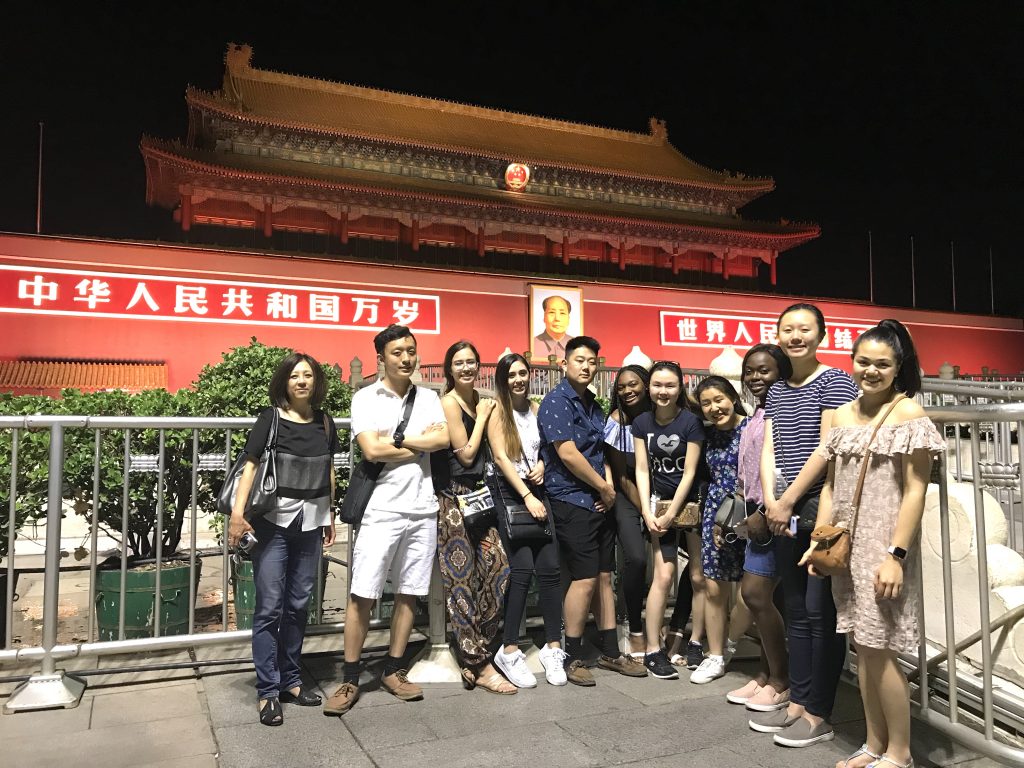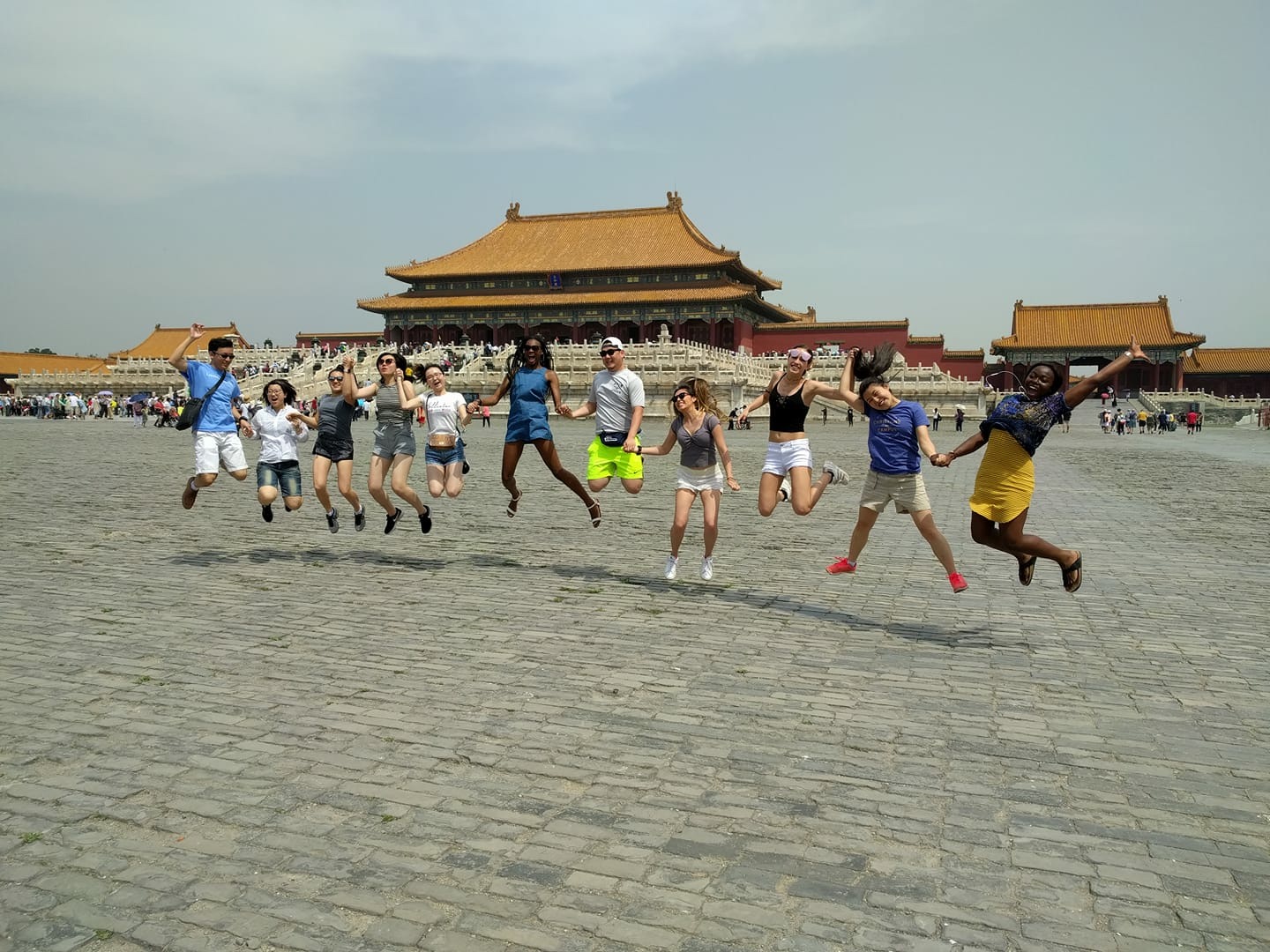China. A land rich in culture, natural beauty, and exotic locales. For those students participating in UConn’s study abroad program in Traditional Chinese Medicine (TCM), traveling halfway around the globe to take courses at Peking University School of Pharmaceutical Sciences (PKUSPS) in the capitol city of Beijing is invariably eye opening. When academics are combined with the opportunity to visit historically important sites such as the Great Wall, the Forbidden City, and the Summer Palace, the total experience can be transformative.
This year, the trip was made even more special because 2018 is the 10thanniversary year of the TCM study-abroad program. The ten UConn students enrolled in the five-week experience were treated to a special anniversary symposium and celebration hosted by the Dean of the PKUSPS School of Pharmaceutical Sciences, Demin Zhou, Ph.D.
Four of the visiting students were invited to share their thoughts about the significance of the TCM program at the symposium. Those who spoke were Yushan (Minnie) Zhang ’20 (Pharm.D.), Julise Marsh ’20 (Pharm.D.), Cindy Guo, ’20 (Pharm.D.) and Derek Pang ’20 (ENG).
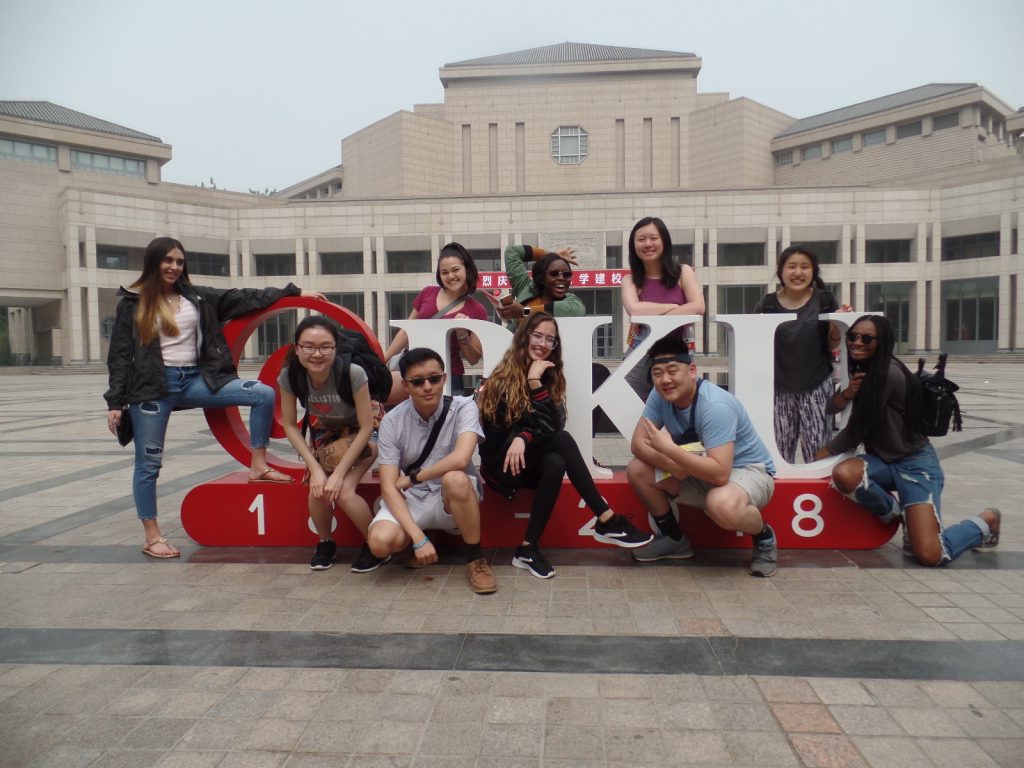
There were a number of other familiar faces from the UConn School of Pharmacy present, including: Dean James Halpert; Head of the Department of Pharmacy Practice, C. Michael White; and Head of the Department of Pharmaceutical Sciences, José Manautou. Also, representing UConn, were pharmacy graduate student Jai He, along with co-directors of the program, Distinguished Professor of Pharmaceutics Diane Burgess, and Associate Clinical Professor of Pharmacy Practice, Fei Wang.
A Partnership
The beginning of the program stems from the friendship forged between Burgess and PKU faculty member, Professor Xiaoda Yang when a sister relationship between the UConn School of Pharmacy and PKUSPS was established in 2007. The two discovered they were kindred spirits as they envisioned a study abroad program that would expose American students to the centuries old practices of traditional Chinese medicine. The first cohort from UConn was welcomed to Beijing in 2008. Subsequently, Burgess was joined by Wang, who came aboard as co-director of the program in 2011.
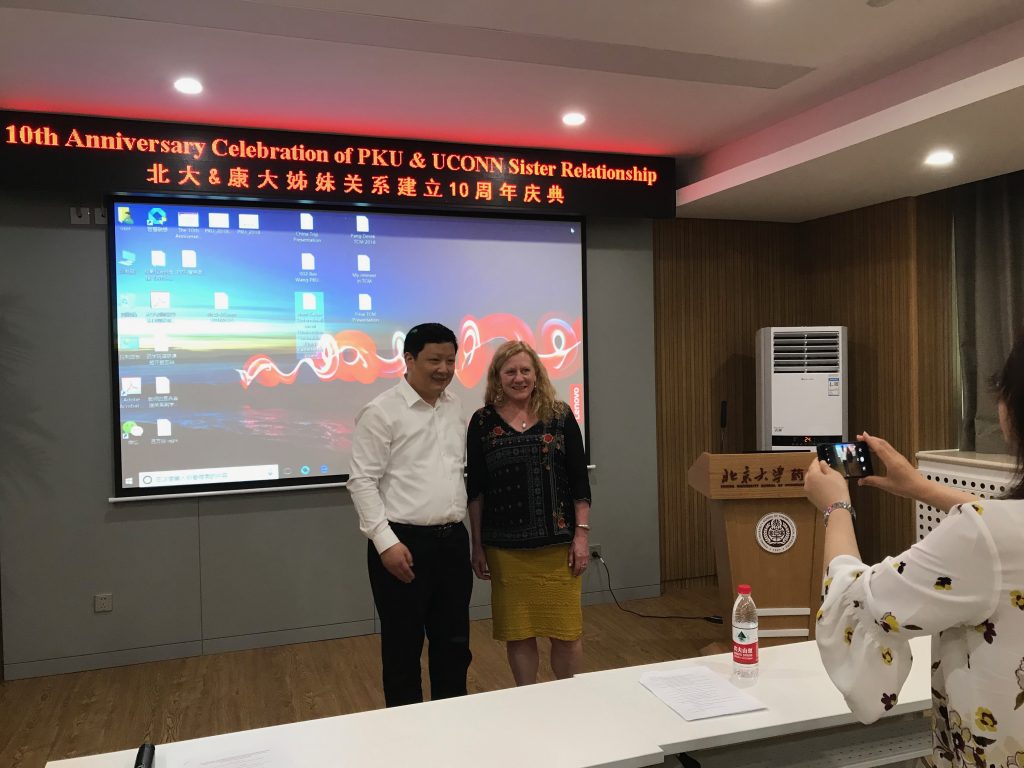
Open to students with backgrounds in the STEM fields of science, technology, engineering, and math, the majority of participants over the past decade have come from UConn. Qualified students from other institutions may participate, as space permits.
Halpert notes that among the many benefits of this study abroad program, “Peking University is the number one ranked university in China in 2018. Being their partner in the TCM program is very prestigious and it definitely helps attract top Pharm.D. students to our school. From the student perspective, participating in the TCM program provides an appreciation for another culture, language, and approach to medicine. It can be a life-changing experience in that it leads to a desire for even more extensive international experience. One former TCM participant, as an example, went on to obtain an Advanced Pharmacy Practice Experience at Taipei Medical University and then to join the Peace Corps.”
The TCM curriculum is taught in English and is designed to provide students with a basic understanding of traditional medicine in China. Courses include the development process of TCM from the Han dynasty {206 BC – 220 AD) to the present, basic theory of traditional Chinese medicine, and an introduction to the 500 or so most commonly used Chinese herbs used by pharmacists and doctors in that country — out of the over 11,000 species available.
There are 28 hours of instruction in basic Mandarin to help attendees successfully navigate their new surroundings, as well as a comprehensive overview of the cultural and practice differences between the US and China.
Below, a clip of UConn students singing in Mandarin at the anniversary celebration:
Also included are field trips to the TCM department of hospitals and to herbal collections. Participants visit the Tongrentang Pharmaceutical Group, the country’s oldest TCM manufacturer, and other TCM manufacturers such as the Tianjin Tasly Pharmaceutical Group, which specializes in modern TCM production methods. They also have an opportunity for field collection and the preparation of sample specimens for storage and future use.
Wang says an added – and unadvertised – bonus, is that Professor Yang offers a daily Tai Chi class to the visiting students.
For Mike White, the TCM experience gives future practicing pharmacists a leg up in dealing with the type of questions consumers frequently ask about vitamins, herbs, and other complementary therapies.
He says, “While we train our students in complementary and alternative medicine, this immersion program takes that training to a whole different level. By going back to the source, it is easier for students to understand how these therapies can best be integrated with traditional drugs in a more seamless manner. Our students also get to experience a completely different culture and learn a new language in the process.”
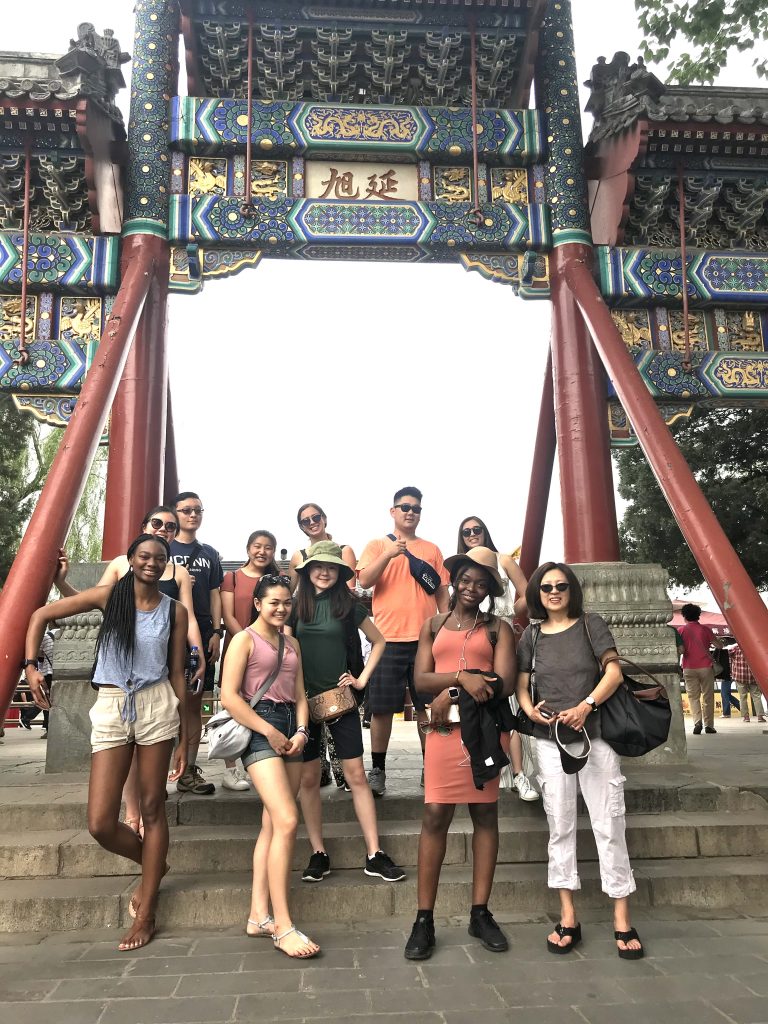
Halpert concurs. He says that from the student perspective, participating in the TCM program provides an appreciation for another culture, language, and approach to medicine. “It can be a life-changing experience in that it leads to a desire for even more extensive international experience,” he says.
As a basic scientist in pharmaceutical sciences, one of Manautou’s goals for this trip was to meet his peers at Peking University to highlight the expertise of UConn School of Pharmacy faculty and to talk about core areas of scholarly work in his department.
He says that he has always been intrigued by the mode of action of natural products (as in the case of TCM) in preventing adverse effects of drugs and environmental stressors. Meeting with fellow scientists in China gave him the opportunity to delve more deeply into this fascinating topic.
And, Manautou adds, “Beyond the educational and scientific exchange that took place during this trip, another highlight was spending time with our students. As faculty, we seldom get a chance to connect with our students outside of the classroom. Opportunities such as this help creating deep and meaningful relationships.”
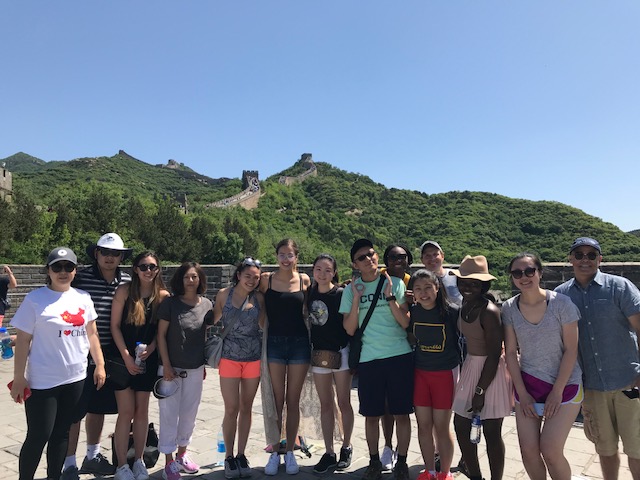
Of course, it is the student experience that is of the utmost importance. “The TCM program was priceless,” said Cindy Guo. “The places we got to see, the foods that we got to try, the people we met, and the TCM curriculum made us go out of our comfort zone and view the world with a new lens. Traveling abroad is much more than being in a different country but about creating experiences that shape who we are.”
Guo and her fellow students summed it up well in their 2018 blog that provides insight into what was important to them from an academic standpoint, and what was just plain fun. In the end, it is their infectious enthusiasm for all things new and different that promises to shape not only their future, but the ongoing relationship between UConn and its sister school in Peking.
